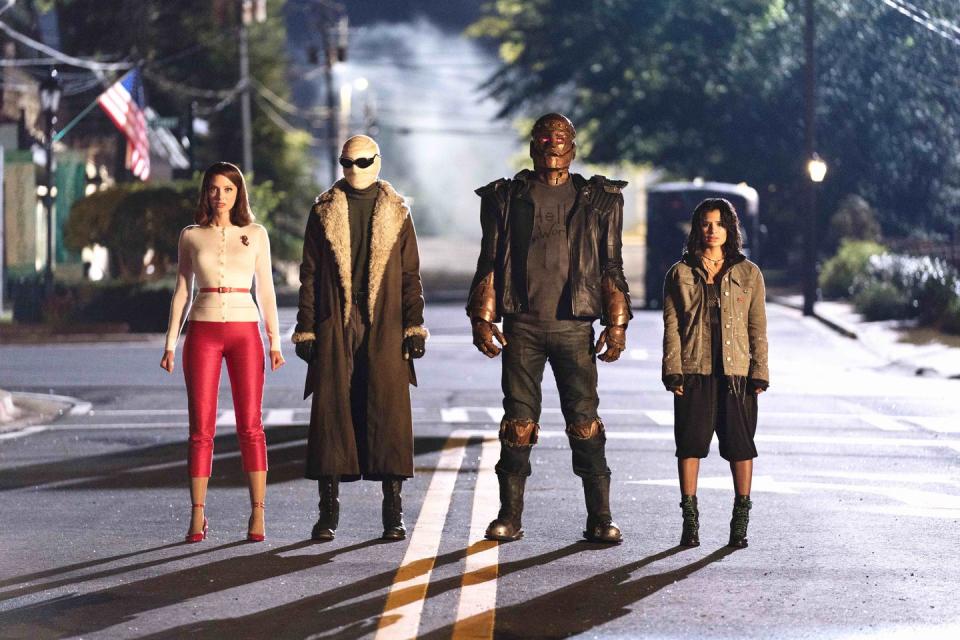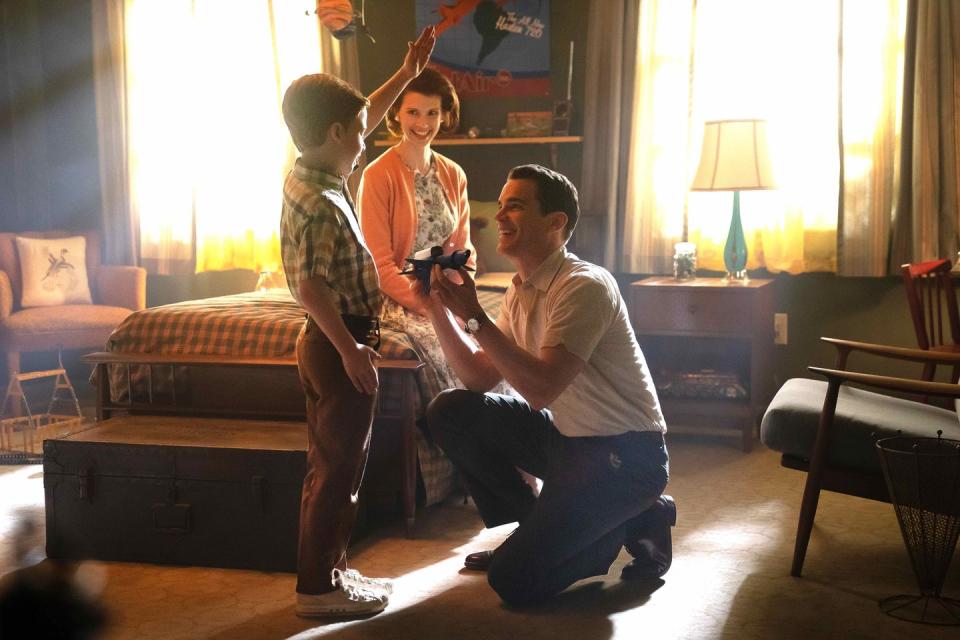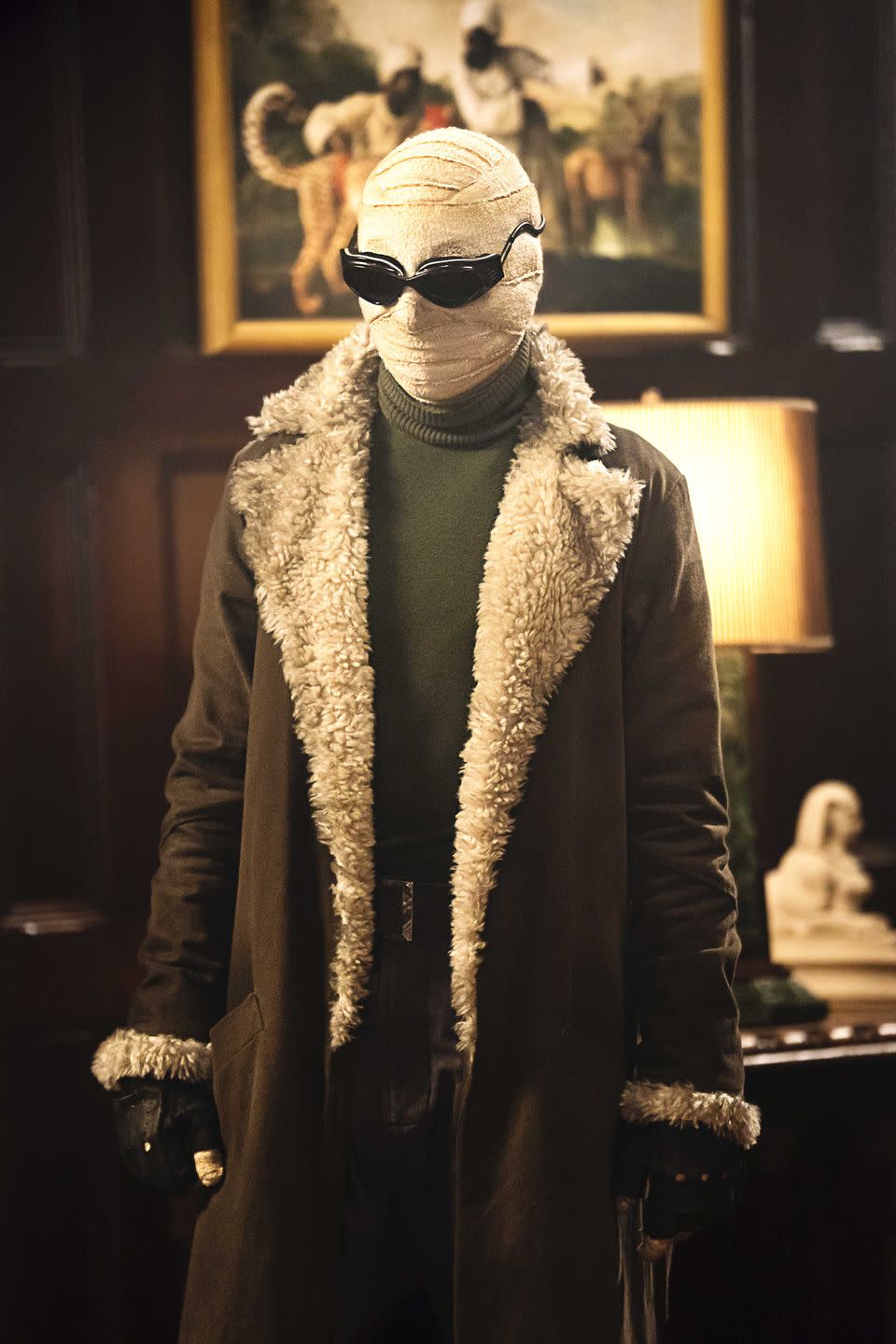Doom Patrol's Matt Bomer on season 2 and the "cost" of playing a gay hero

Rainbow Crew is an ongoing interview series which celebrates the best LGBTQ+ representation on TV. Each instalment showcases talent working on both sides of the camera, including queer creatives and allies to the community.
Today we're speaking to actor Matt Bomer about his heroic role in Doom Patrol.
Matt Bomer wasn't planning to star in a superhero show. He had just finished up Boys in the Band on Broadway when DC approached him for the role of Larry Trainor. As Bomer puts it, "Doom Patrol came out of left field," and that's rather fitting given how wild this show actually is.
Based on comics first written in 1963, the "World's Strangest Heroes" are misfits in every sense of the word. Not only do their bizarre powers alienate them from the world at large, but the Doom Patrol franchise has always been an outlier too, often sidelined in favour of more 'appealing' outsiders like the X-Men.
That's starting to change now though thanks to the Doom Patrol TV show. Inspired by Grant Morrison's relentlessly weird run from the late eighties, this new adaptation subverts superhero tropes by incorporating Dadaist elements of abstract surrealism... and that's exactly what appealed to Bomer in the first place.
"I think we're living in an era of episodics where, you know, the more unique, the better! There's so much content out there. So, I hope the show continues to get weirder and weirder."

Given what we've seen of season two so far, it's safe to say that Bomer's got his wish. Following on from all those carnivorous butts and the cockroach kisses of season one, new episodes include a super-powered ape-faced girl and Doctor Tyme, a disco-loving time traveller who wears a clock for a head.
That's a lot to absorb for even diehard comic-book fans, but as Bomer points out, these "bizarre, offbeat" stories are actually grounded in something far more universal:
"As much as it's a fun superhero show, Doom Patrol is really about the human condition, and the capacity for even the most marginalised amongst us to find our inner hero."
Watching Robotman contend with his shitty past or Rita struggle with her self-worth, it's clear that each member of the team is deeply flawed in some way, much like we all are, and it's this trauma which grounds Doom Patrol, transforming it into something truly special.

The fact these characters aren't heroes in a traditional sense makes their triumphs even more heroic, and that's particularly true of Larry Trainor, otherwise known as The Negative Man.
Bomer says he's "never seen someone like Larry on screen," and that's because there's never been someone like Larry on TV before.
Through multiple flashbacks, we learn early on that Trainor survived a horrific plane crash which transformed him in more ways than one. Not only was Larry disfigured beyond recognition, but when he emerged from the wreckage, he also discovered that a sentient being made of negative energy now lives inside of him.
As if that wasn't traumatic enough, Trainor was already hiding a different kind of negativity before the crash, one personified by his own internalised queerphobia. Decades later, Larry is still wracked with guilt over his sexuality, choosing to hide away from his family and the world at large, not to mention his own urges too.
"I'd never seen that particular story told on screen before," says Bomer. "Someone who had to sacrifice so much of who they were in order to achieve what they wanted; including the cost of the fallout, in terms of their relationships with everyone around them, and how that affected those people as well."
At first, Matt wondered how the writers would be able explore these issues with depth on a superhero show. Fortunately, those concerns didn't take long to subside. Bomer likens his experience working on Doom Patrol to that of "a really great drama", explaining that Larry is "one of the most three-dimensional, fully realised gay characters [he's] ever gotten to play."

"I don't feel like I'm on a superhero show," says Matt. "When I'm on set, I'm doing really dramatic scenes that are filled with pathos and stakes and character development."
This complexity transcends the character, impacting how Larry is brought to life behind the scenes too.
While Matt embodies the role during Larry's flashbacks, there's actually another actor hidden under the bandages called Matthew Zuk. In these scenes, Bomer provides his voice, and together, the two actors represent Larry's duality in a literal sense, combining two halves of a "really unique, creative process."
Because of this, most of Bomer's work on camera is set in the '50s where we watch Larry struggle with how his secret impacts everyone around him. These scenes resonate with Matt on a personal level beyond what a straight actor might feel in the same role.
"I think there's something about being a gay man, and getting to play a fully realised gay character... You're able to access experiences you've had that are very unique to you, but that cost you something to translate onto the screen."
Bomer says "any performance has to cost you something," but that doesn't mean it's all doom and gloom for him on set.
Halfway through season one, Larry reached a turning point in the fan-favourite episode, "Danny Patrol." Upon arriving at a LGBTQ+ club on Danny Street, The Negative Man revealed his inner self when he jumped up on stage and performed a karaoke rendition of Kelly Clarkson's anthem "People Like Us."

Freed of his bandages and his self-loathing, Larry finally accepted himself fully, bathing in the adoration of the queer community he long denied being a part of. It's a glorious, euphoric moment for Larry, except of course, it wasn't actually real at all.
Even when he's singing the line "People like us, we've gotta stick together", Larry is actually sitting alone, imagining a world where he doesn't hold himself back from joy. Instead of taking the mic and living out his fantasy, The Negative Man wallows in his own pain, running away so he doesn't have to face himself.
Looking back on that surprising scene, Bomer recalls how it "came completely out of the blue" for him too: "I was like, 'How are we going to pull this off?'"
"The staging of it was just incredible," says Matt. "Every aspect of the LGBTQ+ spectrum was represented on that stage, and celebrated in such a beautiful way. It was honestly one of my favourite experiences I've ever had as an actor. To shoot it on a superhero show? It was just wild!"
It's no wonder that fans still talk about this scene one year on. Not only did it put Larry on a new path, one where he could gradually come to terms with the negativity that rages inside, but it also represented a rare moment of elation, pushing through the kind of trauma which still often defines queerness on screen.
Moving forward, Larry is finally ready to start embracing the unwanted aspects of his being, including The Negative Spirit, as well as his own negative attitude towards himself.

"I think that when we find Larry this season, he's living in closer harmony with The Negative Spirit inside him," says Bomer. "And he's learning about his children, and that they're still alive."
"And so much of this season – I think for all the characters – is about trauma, and the unearthing of trauma, the dealing with it, and the processing of it. The realisation that as much it's external, it's also internal."
Trauma is still a part of Larry's story, but it no longer defines him in the same way it once did. Instead, his journey in season two can now become one of healing.
"Larry's really trying to deal with the fallout with his family after everything, and the generational damage that he's done because of the decisions he's made, and what's happened to him."
Teasing what lies ahead, Bomer promises "beautiful scenes where Larry is reunited with the modern-day version of his son who's now older than him, and who he hasn't seen since he was a child."
Larry still has a lot of personal growth ahead of him though, and so, in season two at least, "love [of a romantic nature] isn't really at the forefront of his mind." Aside from a brief "flirtation" Bomer says will happen midway through the season, Larry must learn how to love himself first before finding love with someone else.

Towards the end of our chat, Matt explained how a play called The Normal Heart "changed [his] life as a kid," showing him a queer story which must have come out of left-field for heteronormative audiences at the time.
For those who might not know, Larry Kramer's signature work depicts how the AIDS crisis devastated New York's queer community in the '80s. While this might seem worlds away from the fantastical realm of Doom Patrol, these two narratives are actually quite similar in one key respect.
Both stories are rooted in the pain of the past and deviate from the 'norm' by elevating heroic 'outsiders' who exist on the periphery of mainstream society. Delving into the trauma of 'otherness' isn't easy on those who create these works or those who consume them either – and that's true in any context – but it's also vital for us to engage with these experiences if we're ever going to make the world a better place.
As Bomer said earlier on, there's a "cost" to reckoning with these experiences, but it's only when we do so that we can move past the negative spirit inside us all and start to heal.
Doom Patrol is available in the UK through Starz on Amazon Prime.
Digital Spy now has a newsletter – sign up to get it sent straight to your inbox.
Looking for more TV recommendations and discussion? Head over to our Facebook Group to see new picks every day, and chat with other readers about what they're watching right now.
You Might Also Like

 Yahoo News
Yahoo News 